Whose “way of life” is France’s lower house protecting? Not the women who wear niqabs.
Madeleine Bunting argues against the French veil ban.
See also Mehdi Hasan at the New Statesman.

Whose “way of life” is France’s lower house protecting? Not the women who wear niqabs.
Madeleine Bunting argues against the French veil ban.
See also Mehdi Hasan at the New Statesman.
France’s lower house of parliament has overwhelmingly approved a bill that would ban wearing the Islamic full veil in public. There were 335 votes for the bill and only one against in the 557-seat National Assembly. It must now be ratified by the Senate in September to become law.
Many of the opposition Socialists, who originally wanted the ban limited only to public buildings, abstained from voting after coming under pressure from feminist supporters of the bill.
After the vote, Justice Minister Michele Alliot-Marie said it was a victory for democracy and for French values. “Values of freedom against all the oppressions which try to humiliate individuals; values of equality between men and women, against those who push for inequality and injustice.”
“Democracy thrives when it is open-faced,” Ms Alliot-Marie told the National Assembly when she presented the bill last week.
The Council of State, France’s highest administrative body, warned in March that the law could be found unconstitutional. If the bill passes the Senate in September, it will be sent immediately to France’s Constitutional Council watchdog for a ruling. Another challenge is possible at the European Court of Human Rights in Strasbourg, where decisions are binding.
See also “France vote to ban full-face veils condemned by Amnesty”,Amnesty press release, 13 July 2010
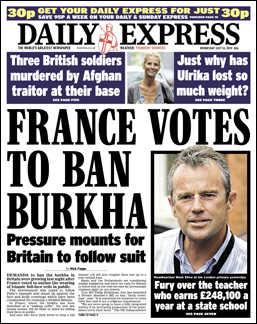 Demands to ban the burkha in Britain were growing last night after France voted to outlaw the wearing of Islamic full-face veils in public.
Demands to ban the burkha in Britain were growing last night after France voted to outlaw the wearing of Islamic full-face veils in public.
The Government was urged to follow Paris’s example and stand up against the face and body coverings which have been condemned for creating a divided Britain.
In France, where the burkha has been described as a “walking coffin”, the new law means women will be fined or jailed for hiding their faces in public. And men who force their wives to wear a full Islamic veil will face tougher fines and up to a year behind bars.
Spain and the Netherlands are considering similar legislation and there are calls for Britain to follow suit as the veils become an increasingly common sight on our streets.
Tory MP Philip Hollobone, who has launched a Private Member’s Bill to ban “facial coverings”, said: “It is unnatural for someone to cover their face and it not a religious requirement. We are never going to have a fully integrated society if an increasing proportion of the population cover their faces.”
A ban on burkhas is supported by 99 per cent of Britons, a Daily Express poll found last month.
See also “Brits say banning the burkha is not anti-Muslim”, Daily Star, 14 July 2010
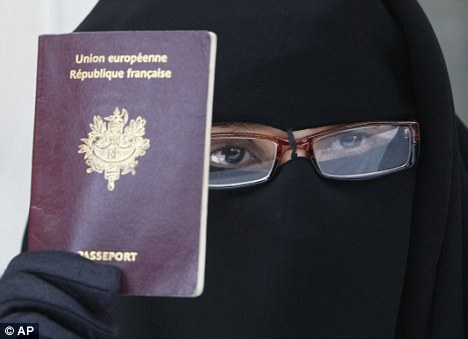 As France’s parliament debates whether to ban burqa-like Muslim veils, one lawmaker compares them to muzzles, or “walking coffins.” Another proclaims that women who wear them must be liberated, even against their will.
As France’s parliament debates whether to ban burqa-like Muslim veils, one lawmaker compares them to muzzles, or “walking coffins.” Another proclaims that women who wear them must be liberated, even against their will.
Amid little resistance, France’s lower house of parliament will likely approve a ban on face-covering veils Tuesday, and the Senate will probably follow suit in September.
Polls show voters overwhelmingly support a ban. In parliament, criticism was mostly timid, and relatively few dissenters spoke out about civil liberties or fears of fanning anti-Islam sentiment in a country where there are an estimated 5 million Muslims, and where mainstream society has struggled to integrate generations of immigrants.
One obstacle, however, may still stand in the way of a ban: the courts. Law scholars say the ban could be shot down by France’s constitutional watchdog or the European Court of Human Rights. That could dampen efforts under way in other European countries toward banning the veils.
Legislator Berengere Poletti, of Sarkozy’s conservative party, argued that women in such garb “wear a sign of alienation on their faces” and “must be liberated,” even if they say the apparel is their own choice.
Communist Andre Gerin, who also supports a ban, said that “talking about liberty to defend the wearing of the full veil is totally cynical – for me, the full veil is a walking coffin, a muzzle.”
Socialist Jean Glavany, one of the few lawmakers to offer stinging criticism of a ban, said dwelling on questions of French identity and whether burqas are welcome in France “is nothing more than the fear of those who are different, who come from abroad, who aren’t like us, who don’t share our values.” He was also one of several lawmakers to question the bill’s “judicial fragility.”
Associated Press, 12 July 2010
See also “French National Assembly debates burqa ban”, WSWS, 12 July 2010 and “French entrepreneur offers to pay veil fines”,Reuters, 12 July 2010
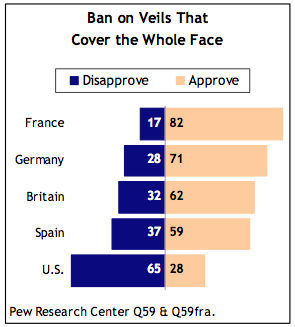 Days before French lawmakers are due to vote on a bill that would make it illegal for Muslim women to wear full veils in public, a US poll has found that a majority of Europeans back such a ban while Americans reject it.
Days before French lawmakers are due to vote on a bill that would make it illegal for Muslim women to wear full veils in public, a US poll has found that a majority of Europeans back such a ban while Americans reject it.
The French overwhelmingly endorse a ban on Muslim face coverings, also known as the burqa or the niqab, as do majorities in Britain, Germany and Spain, a survey conducted by the Washington-based Pew Research Center’s Global Attitudes Project found.
More than eight in 10 people in France said they would approve of a ban on Muslim women wearing full veils in public, including in schools, hospitals and government offices, the survey, conducted over three weeks in April and May, found. Just 17 percent of French people were opposed to a ban on the burqa.
Majorities in Germany (71 percent), Britain (62 percent) and Spain (59 percent) said they would support a burqa ban in their own countries. But in the United States, the opposite was true, with two-thirds of Americans saying they were against a ban on full veils in public.
Download the poll report (pdf) here.
The report finds that in Europe and the US “support for a ban on Muslim women wearing a full veil is more pronounced among those who are age 55 and older” and that “those on the right in France, Britain and Germany are more likely than those on the left to approve of a ban on women wearing the full Islamic veil in public places”.
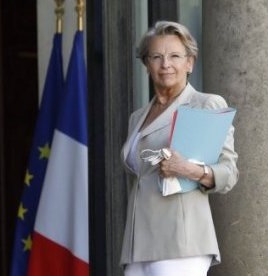 France’s justice minister went before parliament to defend a hotly debated bill that would ban burka-style Islamic veils in public, arguing that hiding your face from your neighbours is a violation of French values.
France’s justice minister went before parliament to defend a hotly debated bill that would ban burka-style Islamic veils in public, arguing that hiding your face from your neighbours is a violation of French values.
Michele Alliot-Marie’s speech at the National Assembly marked the start of parliamentary debate on the bill. It is widely expected to become law, despite the concerns of many French Muslims, who fear it will stigmatise them. Many law scholars also argue it would violate the constitution.
The government has used various strategies to sell the proposal, casting it at times as a way to promote equality between the sexes, to protect oppressed women or to ensure security in public places.
Ms Alliot-Marie argued that it has nothing to do with religion or security – she argued simply that life in the French Republic “is carried out with a bare face”.
“It is a question of dignity, equality and transparency,” she said in a speech that made little mention of Muslim veils. Officials have taken pains to craft language that does not single out Muslims: While the proposed legislation is colloquially referred to as the “anti-burka law”, it is officially called “the bill to forbid covering one’s face in public”.
Press Association, 7 July 2010
See also Al Jazeera, 7 July 2010
France moves closer to banning the full-face veil today when its parliament begins debating a law that would outlaw the wearing of the burqa or the niqab anywhere in public. It is a measure that seems popular with the public. Polls suggest 70% back a ban.
The numbers that wear the full-face veil in France are tiny. Perhaps 2,000 and then the tourists from the Gulf, who like to shop in the luxury stores on the Champs Elysees.
The French government says this is not an argument about religion but about values. By adopting this legislation the French are insisting that those who live in France abide by their values. As the writers of the legislation say, hiding your face in public is “an offence to the nation’s values”. It violates the republican ideals of secularism and gender equality.
The French President, Nicolas Sarkozy, said it was “a sign of debasement”. The Immigration Minister, Eric Besson, described the burqa as a “walking coffin”. The French Prime Minister, Francois Fillon, said Muslims who wear face coverings are “hijacking Islam” and provoking a “dark and sectarian image”.
Gavin Hewitt’s Europe, 6 July 2010
See also “French opposition to boycott vote on burqa ban”, AFP, 6 July 2010
AFP reports that last night 18 graves in the Muslim section of a cemetery in the Strasbourg suburb of Robertsau were desecrated.
Twelve headstones were overturned, while the perpetrators overturned or damaged plaques and decorations on six other graves.
“Deliberately targeting the Muslim section is unspeakable, it is a barbaric act”, Driss Ayachour president of the regional Muslim Council of Alsace was quoted as saying.
The Socialist mayor of Strasbourg, Roland Ries, who visited the scene this morning, announced that the municipality would cover the cost of restoring graves.
See also “18 tombes musulmanes profanées à Strasbourg”, L’Express, 29 June 2010
Update: See “Cemeteries desecrated in Strasbourg: three skinheads receive prison sentences”, Islamophobia Watch, 20 June 2012
French lawmakers will begin on July 6 to debate a government proposal to ban the Muslim full-face veil from public spaces, a minister said on Tuesday.
The lower house National Assembly will read the bill before it passes to the Senate in September and it could be adopted into law soon after, said Henri de Raincourt, the minister for parliamentary relations.
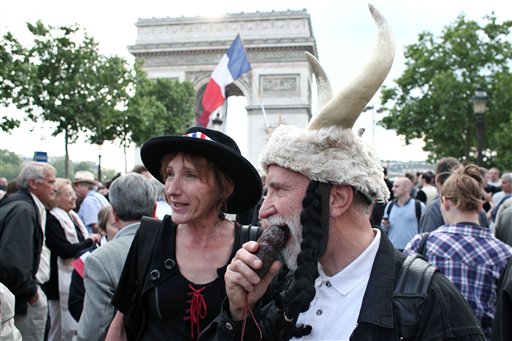
Several hundred people have attended a party serving sausage and wine on a Paris street after the event was banned from a different location.
Organizers had planned on holding the event in a heavily Muslim neighborhood of the French capital. The so-called “Sausage and Booze” gathering was seen as offensive to Muslims, and police banned the event earlier this week.
That didn’t stop some 300-400 people from turning out for the party Friday. Some carried French flags.
Instead of the neighborhood originally chosen, it took place on the famed Champs-Elysees avenue near the Arc de Triomphe. Police officers looked on as revelers tucked in to sausages and drank wine from plastic cups.